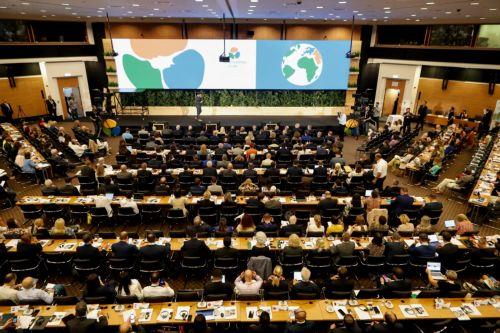(Report by Evie Andreou of Cyprus News Agency)
For greater action to tackle “the triple planetary crisis” affecting climate, nature and pollution, calls the 7th pan-European environmental assessment, presented on Wednesday at the 9th Environment for Europe Ministerial Conference, taking place in Nicosia between October 5 and 7.
The joint report by the United Nations Economic Commission for Europe (UNECE) and the United Nations Environment Programme (UNEP) says that, despite progress in certain areas, governments in the pan-European region must show far greater ambition in tackling climate change, protecting ecosystems and managing and tackling waste and pollution.
Officials note that the UN has the tools to tackle these challenges.
UNEP Executive Director, Inger Andersen, said everyone knows what they need to do, calling for joint action. “As citizens feel the pinch and are facing higher energy bills than ever before, as they see record temperatures and their water reservoirs shrink, and the continent is confronted with other profound challenges, countries must show that there is a plan,” she said. Andersen argued that “the science is unequivocal” and that the only way forward is to secure a clean and green future. “This assessment can be a guide for lowering emissions, a healthier environment for people and for nature, and better waste management and cleaner air,” she added.
As regards air pollution, the report said that some progress has been made in the past years through the implementation of policies, but increased effort is needed, as air pollution “remains the greatest health risk in the region”. It said that all countries should align ambient air quality standards with latest WHO guidelines.
It also said that while all countries in the pan-European region have committed to reducing greenhouse gas emissions, net emissions are still rising. “Reductions, mostly achieved in the western part of Europe (2014–2019), are offset by the increase in emissions in the rest of the region,” it said, adding that the use of renewables increased in 29 countries in 2013-2017, but the region still largely relies on fossil fuels – accounting for some 78% of total final energy consumption. Governments, it said, should eliminate or reform harmful subsidies and incentives (all countries in the region continue to implement fossil fuel subsidies) and develop effective incentives to deepen decarbonization by shifting promotion of investments towards renewable energy.
On water challenges, it said that cooperation “remains key” in addressing them, as the region’s river basins, lakes and aquifers are subject to multiple stresses, and climate change is delivering additional challenges for freshwater quantity and quality such as floods, droughts, waterborne diseases and biodiversity changes in aquatic ecosystems. Pollution and urban and industrial wastewater discharges remain significant and persistent organic contaminants are of public health concern, it adds.
It also said that concerted action is required as regards ecosystems as their status “remains a cause for concern, with no evidence of a clear positive overall trend in the region.” While marine protected areas have grown in area by 66% and terrestrial ones by 22% over the past five years, overall biodiversity loss continues to occur, it adds.
The report also notes that a circular and a more efficient economy will help address growing waste and resource use. It said that over the past half-century, the extraction of minerals has tripled globally, with the extraction and processing of natural resources accounting for over 90% of biodiversity loss and water stress and about 50% of climate change impacts. It urges governments in the region to adopt a circular – or resource efficient – economy approach and strengthen management of raw materials, including, for example, through the application of the UN Framework Classification for Resources and the UN Resource Management System.
Among other things, the report said that green financing is needed while sustainability must be at the heart of infrastructure development.
Most countries in the region, it said, have yet to develop mechanisms to incorporate sustainability considerations (such as climate risk) and externality accounting (e.g., the cost of pollution, ecosystem services, or biodiversity protection) into the cost-benefit analysis of large infrastructure projects. Existing tools offered by UNECE and UNEP can remedy this, it adds.
The 9th Environment for Europe Ministerial Conference – the UN’s highest body on environmental policy in the region, covering 54 countries across the European Union, European Free Trade Association members, the Balkans, the Caucasus, Eastern Europe and Central Asia – is hosted by the Government of Cyprus with secretariat support from UNECE, in cooperation with UNEP, OECD and other partners.



